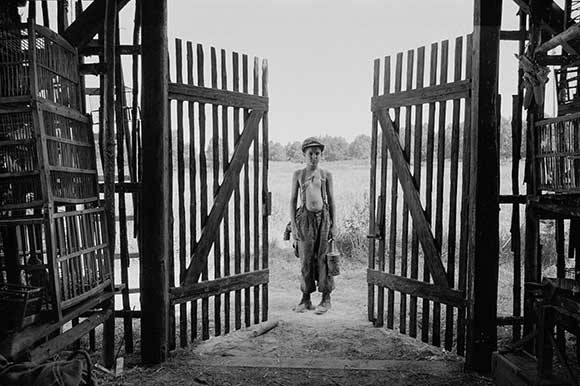The black and white film with a running time of 170 minutes, which is shot in Slavic Esperanto, Czech, Russian and German, took the very determined Marhoul more than 11 years to bring to the screen. The film boasts an impressive cast of actors in supporting roles, including Udo Kier, Lech Dyblik, Jitka Čvančarová, Stellan Skarsgård, Harvey Keitel, Julian Sands, Barry Pepper and Aleksey Kravchenko, but its main star X does not speak a word throughout the whole film.
Beautifully lensed by Czech DoP Vladimir Smutny the film is a meticulous evocation of wild, primitive Eastern Europe at the bloody close of World War II. The story follows the journey of a young boy, played by lead Petr Kotlár, entrusted by his persecuted Jewish parents to an elderly foster mother. But the old woman soon dies and the boy is left on his own, wandering through the country-side. As he struggles to survive, the boy suffers through extraordinary brutality meted out by the superstitious peasants and he witnesses the terrifying violence of the efficient, ruthless German army. When the war ends, his father who has been in a concentration camp, manages to find him but the boy who has not spoken a word throughout the film is so traumatised all he can do is scrawl his name, Joska on the dirty window of a bus to communicate with his father.
Marhoul has said the film is not a war film or a Holocaust film but a film about the timeless struggle for survival. The extreme suffering and endless sadism that the boy is subjected to is indeed a story of his for survival. But the stark and formal beauty of the cinematography makes this a vision of hell with no kindness or redeeming characters to offer any hope.
One of the most horrific scenes shows the young boy buried up to his neck in the ground while a group of huge black birds peck at his skull. He has been buried there not because of the war but because of the ignorance of a peasant woman who has buried him there. Again and again we see how the ignorance and backwardness of peasants and villagers is as brutal as anything the war has managed to make.
One of the most interesting scenes is when a bird-keeper that has taken the boy in paints a bird’s wings and releases it into a flock of birds. Because the bird is different he is pecked to death by the other birds. This cruel trick fills the man with laughter as the boy watches in horror. The idea here seems to be that a group will attack one of its members because of it being different.
But while this is no doubt a profound part of the message of the film and its relationship to the Jewish people and the Holocaust is obvious, there does not seem to be any necessity for someone to be different for them to be attacked. Cruelty seems to be universal in the hellscape.
The film is beautifully made and its formal discipline is impressive but it makes for tough viewing and audiences will need stamina and a willingness to absorb its bleakness in order to reap the rewards it offers. It is worth the journey.
Vaclav Marhoul participated in the ScripTeast programme with The Painted Bird, where the project received a Special Mention.
The Painted Bird (Czech Republic, Ukraine, Slovak Republic)
Director: Václav Marhoul
Cast: Petr Kotlár, Udo Kier, Lech Dyblik, Jitka Čvančarová, Stellan Skarsgård, Harvey Keitel, Julian Sands, Barry Pepper, Aleksey Kravchenko
Produced by Silver Screen
Coproduced by the Czech Television, Directory Films, PubRes and RTVS
Supported by the Czech State Cinematography Fund, Creative Europe – MEDIA, the Ministry of Culture of the Czech Republic, the Slovak Audiovisual Fund, the Ukrainian State Film Agency
International sales: Celluloid Dreams




















